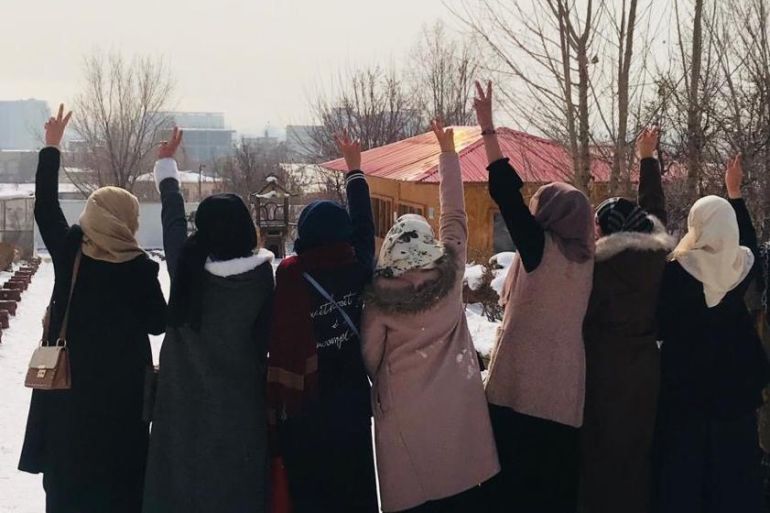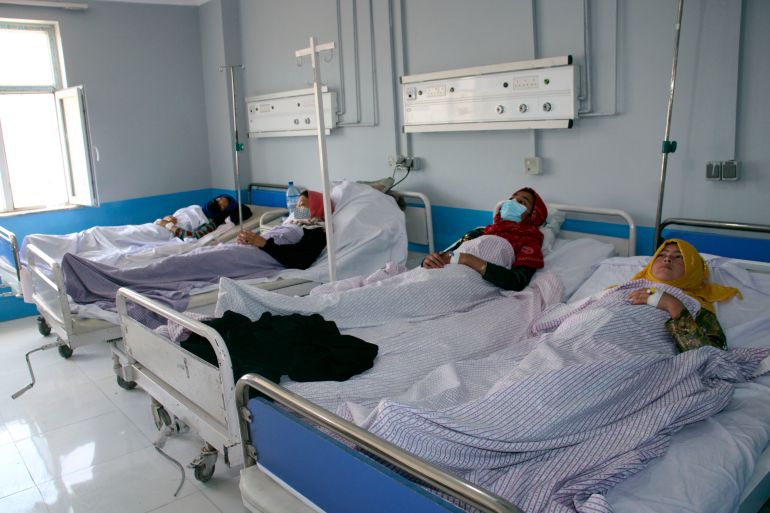
Lima stayed home the last time the Taliban inspected the hospital where she secretly trains as a nurse.
After five years of medical training, Lima, 28, should be one year into her residency as a doctor, perfecting her diagnostic skills. Instead, she takes temperatures and administers injections, tasks she has been doing at an emergency room in Kabul for three months now. While this is not the work she expected to be doing at this point in her career, she’s happy to at least be doing this.
“Being at the hospital means I can stay close to my field. It helps me to stay connected to it,” Lima told Al Jazeera over the course of several telephone calls. She is identified by her first name only for safety reasons.
Lima was just weeks away from graduating from a medical school in Kabul when the Taliban banned higher education for women last December, interrupting her studies and that of thousands of other women. Women already qualified as doctors, nurses and other medical workers are permitted to continue in their jobs, but no new women may enter the field or undertake training.
More than 3,000 women who had already graduated from medical schools before the ban were barred from taking the board exams required to practise, depriving the country – already struggling from a dire shortage of female medical workers – of a desperately needed infusion of new doctors.
For Lima, medicine has been a lifelong dream. She longs to become a surgeon, partially because she knows there is a shortage of them.
“My biggest hope is to help people,” she said.
Her family moved home to Afghanistan from Pakistan so she could attend university in Kabul where she thrived – she did well in her classes and was appointed her class’s “leader”, handling administrative tasks.
On the day they heard about the new ban on women completing medical studies, Lima and her classmates were having lunch together. They cried together because of what this would mean for their future and because they were worried they would not be able to see each other again. The Taliban’s strict ban on women leaving their homes without a male chaperone makes meeting friends near-impossible.
After the news broke, Lima called one of her professors and persuaded him to let her and her classmates take one of the exams they were scheduled to take that week. It was not for an official grade but just for them to know they could do it. The professor agreed, but when Lima and her classmates arrived at the university to take the test, the Taliban, armed with guns, were already guarding the doors.
It was no longer safe, the professor told Lima.

Girls in Herat gather to stage a demonstration demanding the right to continue their education in schools and universities, on September 20, 2021, in Herat, Afghanistan
A secret internship
Almost a year later, many women have refused to give up on their chosen path and have continued studying on their own or online, hoping that they will one day be allowed to study officially at university and medical school again. Some women have managed to work around the restrictions, finding secret internships and residency opportunities.
“It’s like a refreshment for my studies, for my knowledge. This is the best way for me to do something for my goals,” says Noor*, whose name has been changed to ensure her anonymity. Like Lima, she was just about to graduate from medical school when the Taliban’s ban brought her studies to an abrupt halt. The order hit her hard.
She spent months studying solo, holding on to medicine as “the only goal” she ever had in her life. She reviewed her notes, read thick medical books in English and took online courses, focusing on what she believed to be any gaps in her knowledge. But working alone for weeks on end, she says she fell into a depression and had to listen to motivational speakers for an hour per day just to muster the will to keep going.
In September, nine months after the ban, Noor lost hope that the university would reopen and called the hospital that had offered her a two-month internship back in 2020. They agreed to let her come in to complete it. Everyone treats it as a secret.
When the two months were up, the hospital allowed her to stay on to continue observing surgeries for as long as she wished. Noor says she is too afraid to even think about what would happen if the Taliban discovered her studying there. It is unclear what would happen if she was discovered, but women found studying medicine or undertaking internships would likely be removed from hospitals and banned from returning, if not worse. There have already been arrests of activists who tried to defy the ban on girls’ education.
Whatever the risks, however, women refuse to stop trying to defy the ban on higher education completely.
“Never in the history of Afghanistan have we had so many educated, well-aware-of-the-world and well-aware-of-their-duties-and-rights women. It’s impossible to silence them, it’s impossible to push them aside,” says Fatima Gailani, a London-based women’s rights activist and former president of the Afghan Red Crescent Society, in an interview over WhatsApp.

Afghan nurses wait to receive their salaries at the Indira Gandhi Children’s Hospital in Kabul, Afghanistan, on February 24, 2022.
Women’s healthcare at stake
Despite the Taliban’s initial promise to take a moderate approach towards women’s rights after it seized power in August 2021, the ban on higher education is just one of many steps that the armed group has taken to further segregate the country and limit women’s role in society.
In the immediate aftermath of August 2021, the Taliban banned girls from going to school beyond the sixth grade and imposed strict rules requiring women to wear hijabs and to travel only with a male chaperone. They closed down beauty salons and blocked women from working with domestic and international non-governmental aid groups, sparking international outrage on the matter.
“Afghanistan under the Taliban remains the most repressive country in the world for women’s rights,” said Roza Isakovna Otunbayeva, head of the United Nations Assistance Mission in Afghanistan (UNAMA) in March, presented the latest report of the secretary-general on the country to the Security Council.
Afghanistan has an urgent need for female doctors as they are often the only healthcare providers available for women and children. While there is no explicit law that forbids it, many traditional Afghan families do not allow their female relatives to be seen by male doctors. This is a particular issue in rural areas where women often have to travel for hours to see a female doctor. Once the current generation of female doctors and nurses retires, even this may not be an option.
“The women here in Kabul and in the provinces are suffering from a lack of women doctors. They are suffering from [lack of] access to health facilities. They are suffering from a lack of access to the treatments that they want,” says Aminulhaq Mayel, deputy country director at the Swedish Committee in Afghanistan, a foreign aid organisation.
In 2020, the World Health Organization estimated that 24 women were dying each day in Afghanistan from pregnancy or childbirth-related causes. While this ranked as one of the highest rates in the world, it was significantly lower than 2001.
Now experts fear a sharp reverse in those limited gains.
In the aftermath of the Taliban takeover two years ago, Afghanistan lost billions in foreign aid and investment, including for healthcare services. By September 2021, 80 percent of national health facilities had reported operational difficulties due to insufficient funding, staff shortages or medical supply scarcities. The Red Cross and the UN were forced to step in and pay the salaries of tens of thousands of staff.
Some hospitals were shut down. Many doctors fled the country, increasing the strain on those who stayed.

Afghan girls receive treatment at a hospital in Sar-e-Pul province in northern Afghanistan on Monday, June 5, 2023. In many parts of Afghanistan, girls and women may not receive treatment from male doctors. Now that women have been banned from going to university, there are major concerns about the provision of healthcare to women in the future [AP Photo]
Pressured to marry – ‘an end to my dreams’
“If the universities are not allowed to teach women and women can’t be educated in medicine, that is absolutely disastrous,” says Gailani. “The lack of women doctors will have a catastrophic effect on women’s health. Maternal deaths will go up. It has already gone up.”
Lima says she has already witnessed the strain on healthcare accessibility imposed by the shortage of female doctors. The hospital does not have a gynaecologist and they have to reject women coming in with maternity-related issues. They have midwives, but they need doctors to deal with emergencies.
Lima does not know what has happened to the women for whom they could not find places in other hospitals, but she fears for their wellbeing.
“If it happens here in Kabul, what’s happening in the villages? I cannot imagine,” she said.
Lima still wants to become a doctor, but even if she stays on the path to becoming a nurse, she lacks the official certificates that would have come after the two years of specialised education in nursing. While her medical education was enough for the hospital to take her in unofficially, it was not enough to formally work as a nurse.
Lima does not know how long she can continue her covert training, even if the Taliban does not catch her. Without the proper paperwork, there are no job opportunities awaiting her at the end of her training. It is also quickly becoming unaffordable. She pays 10,000 afghanis per month ($142) for the residency – the same amount she would have paid if it was official.
There is no official data for average salaries in Afghanistan, although some private data sources put it at about $180 per month, demonstrating the financial toll that Lima’s internship is taking. Lima says doctors earn about $700 per month, and this is considered to be a high salary. In 2021, gross domestic product (GDP) per capita was recorded at just $356.
Without a clear path to becoming a medical professional, she is also facing increasing pressure from her parents to get married.
“I’m just thinking about how I can help women and how to become a doctor,’” said Lima. “If I get married, everything would be lost. My dreams would be shattered.”
Lima is worried that if she gets married, her husband might forbid her to work – some men do not let their wives have a career. Even knowing that her parents would allow her to choose between proposals and demand she be allowed to work, it is still not a guarantee the man would keep his promise. She does not think she will be able to resist the pressure to get married for more than a few more months unless universities reopen by then.
With only enough money left to afford a few more months of her secret residency, Lima’s last hopes for a career in medicine hinge on being allowed to resume her studies – officially – before she runs out of time.
No comments:
Post a Comment